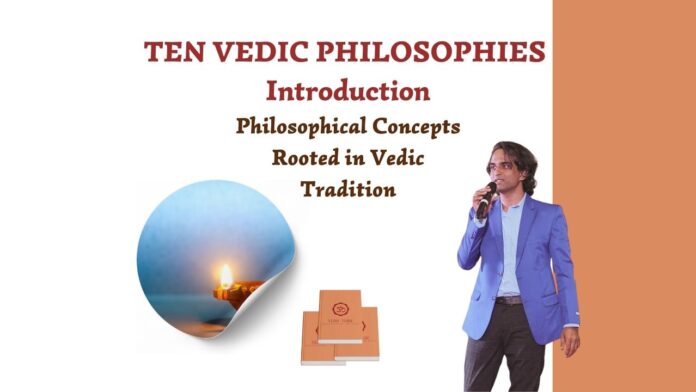Is “Veda” all about rituals and metaphysical ideas?
The Vedic tradition, often misunderstood as merely ritualistic or purely metaphysical, is a rich tapestry of diverse philosophical thought. While Darshanas like Samkhya & Yoga have gained popularity, the Vedic tradition encompasses a broader spectrum of philosophical ideas.
It’s fascinating to note that many of these ideas have parallels in Western philosophy. However, the specific applications and cultural contexts in which these ideas have been interpreted and applied have evolved over time.
In the present age of “cultural cringe” i.e., apathy of Indians towards our own culture, it is very important to discuss our rich philosophical heritage and bring it to the knowledge of the general public.
The interplay between Indian and Western philosophy has often led to a debate about the origin and influence of philosophical ideas. This debate centres around the question of whether philosophical concepts originated in India and subsequently spread to the West, or vice versa.
The Indian Perspective:
During the independence movement and also in post Independent India, Indian philosophers asserted that many of the fundamental philosophical ideas, such as the concept of the soul, the nature of reality, and the pursuit of enlightenment, originated in India.
This was the result of works of German philosophers like Friedrich Nietzsche, who suggested that Indian philosophy had a profound influence on Western thought. Another German philosopher Arthur Schopenhauer stated that: “In the whole world there is no study so beneficial and so elevating as that of the Upanishads… It has been the solace of my life; and it will be the solace of my death. They are the product of the highest wisdom.”
The Western Perspective
Western philosophers, on the other hand, often trace the roots of philosophical inquiry to ancient Greece, with figures like Socrates, Plato, and Aristotle laying the foundations of Western thought.
Socrates is widely regarded as the father of Western philosophy. Socrates is famous for his unique method of inquiry, which involved asking a series of questions to challenge assumptions and encourage critical thinking. This method, known as the Socratic method, is still used in western education and philosophy today.
Aryan origins:
The now disproved Aryan Invasion Theory and also the controversial Aryan Migration Theory – asserts that the ancient philosophical wisdom travelled from west to the east.
According to these controversial theories, such knowledge transmission occurred when the hypothetical Aryans invaded / migrated to the Indian subcontinent.
For spiritual seekers:
The takeaway: A comparative study of Eastern and Western philosophies offers a rich and rewarding experience for spiritual seekers. By examining the diverse perspectives, methodologies, and goals of these traditions, we can gain a deeper understanding of the human condition and our place in the universe.
Pride and nationalism: By exploring these diverse perspectives, we can gain a more nuanced and comprehensive understanding of philosophical concepts. For Indians, studying Eastern philosophy, particularly Indian philosophy, can foster a deeper appreciation for our rich cultural heritage. This has the power to get rid of “cultural cringe” at the national level
Interest in Veda and Vedic scriptures: By understanding deep philosophical thoughts in Vedic tradition, one can develop interest in Veda and Vedic scriptures. This is an essential element in one’s spiritual progress.
A transformative journey: By engaging in a comparative study of Eastern and Western philosophies, we can embark on a transformative journey of self-discovery and spiritual growth. We can learn to appreciate the wisdom of the ancients, while also critically examining their ideas in the light of contemporary knowledge.
The Vedic Tribe is happy to introduce these ten philosophical thoughts in Vedic tradition:
1. Altruism – practice of unselfish concern for or devotion to the welfare of others
2. Asceticism – practice of severe self-discipline and abstention from indulgences
3. Compatibilism – proposition that free will and determinism can coexist
4. Hedonism – pursuit of pleasure and avoidance of pain
5. Epistemology – study of knowledge, focusing on its nature, origin, and limits
6. Rationalism – proposition that reason, rather than sensory experience, is the primary source of knowledge
7. Pantheism – proposition that God is everything and everything is God
8. Panentheism – proposition that God encompasses and interpenetrates every part of the universe, and also transcends it
9. Absolutism – proposition that the existence of absolute truths or values that are universal and unchanging
10. Abstractionism – proposition that concepts are formed by abstracting common features from experiences or existing concepts
In the next article, we will discuss the philosophical idea – Altruism.
Our intention is to create enough curiosity in you to enable you to study scriptures in Vedic tradition and adopt its teachings in your day-to-day life.
All the best.
Madhwesh K
Vedic Tribe

